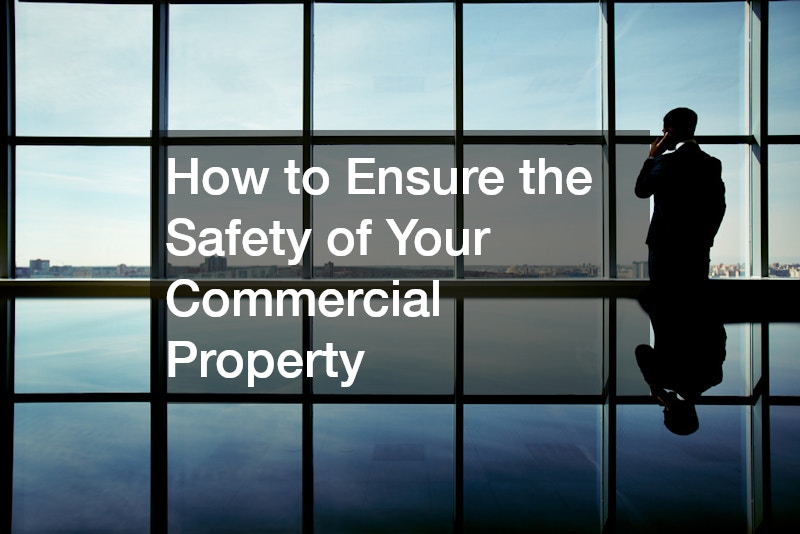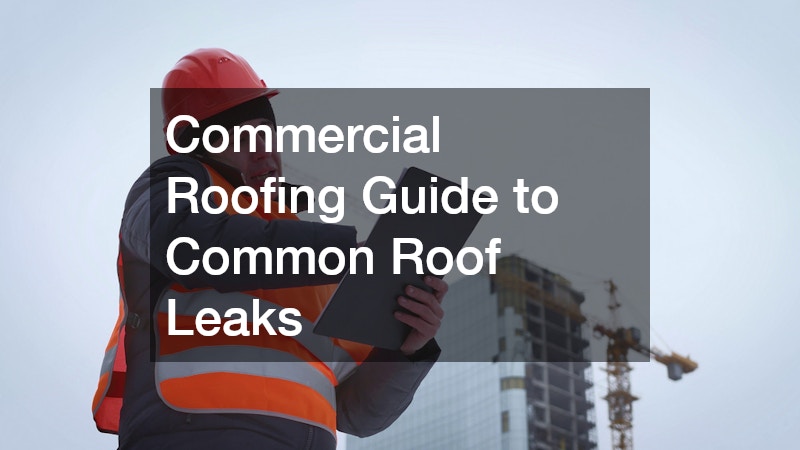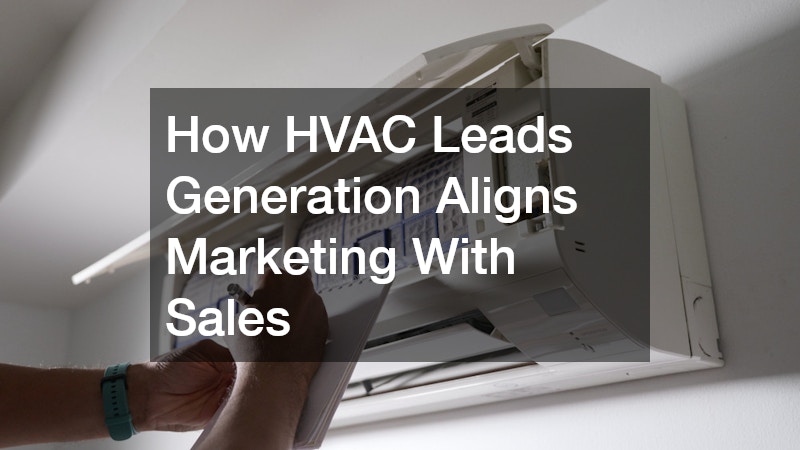Ensuring the safety of your commercial property is a critical responsibility for business owners. From securing entry points to implementing fire safety measures, safeguarding your property requires a comprehensive approach that addresses various vulnerabilities. In this guide, we’ll explore how to protect your commercial property effectively, from physical security measures to fire prevention strategies. By incorporating everything from high-quality fencing to advanced surveillance systems, you can ensure a safe, secure environment for your employees, customers, and valuable assets.
Start With Perimeter Security: Fencing and Gates
Establishing a secure perimeter around your commercial property is essential for keeping unauthorized individuals out and protecting your business. Fencing serves as your first line of defense, helping to control access to the property while deterring intruders. Local fence companies offer a wide range of fencing options, allowing business owners to choose the most appropriate solution for their specific needs. One of the most durable and effective choices is an iron fence, which provides a strong physical barrier while enhancing the aesthetic appeal of your property.
Iron fences are particularly well-suited for commercial properties because of their durability and resistance to environmental wear and tear. Over time, fences made of less robust materials like wood may deteriorate, leaving gaps that compromise security. On the other hand, iron fences are built to last, even in areas prone to severe weather conditions. Many businesses also choose to install automated gates alongside their fencing systems, offering a convenient and secure way to control who can access the premises. These gates can be paired with keycard or biometric entry systems to enhance security further.
Investing in high-quality fencing not only increases the security of your commercial property but can also add value to your business by giving it a professional and well-maintained appearance.
Securing Entry Points: Locks and Garage Doors
While a secure fence forms the outer perimeter, the next step in protecting your commercial property is securing all entry points, including doors and garage doors. These access points are often targeted by intruders, making it essential to have high-quality locks and security measures in place. Partnering with a reputable locksmith company that specializes in commercial lock services can provide your business with a range of security options.
Traditional locks may no longer be sufficient to protect modern commercial properties. Many businesses are now adopting keyless entry systems, which allow employees to access the building using a keycard, smartphone, or biometric verification. These systems offer better control over who can access different areas of your property and allow you to revoke access quickly if an employee leaves the company or loses their keycard. In addition to improving security, keyless entry systems eliminate the risk of physical keys being copied or stolen.
Don’t overlook the importance of securing garage doors, which often provide access to storage areas or loading docks. Automated garage doors with keypad or remote-controlled entry ensure that only authorized personnel can open the doors. Moreover, reinforced garage doors are harder to tamper with, offering an additional layer of protection for businesses that store valuable goods or equipment on-site.
Another often-overlooked security measure is the installation of a security screen on entry points, particularly on windows or sliding glass doors. Security screens provide an additional barrier against forced entry while allowing for visibility and airflow. This makes them an ideal solution for ground-floor windows, which are often vulnerable to break-ins.
Surveillance and Monitoring: Video Inspections and Security Cameras
Surveillance is a crucial component of any commercial property security system. Modern surveillance systems can do much more than record video; they offer real-time monitoring and advanced features like motion detection and remote access. For large properties, conducting regular video inspections allows business owners to monitor different areas remotely, ensuring that everything is functioning as it should.
High-definition security cameras should be placed at key points around the property, such as entrances, exits, parking lots, and sensitive areas like storage or server rooms. These cameras not only deter criminal activity but also provide valuable evidence if an incident occurs. The latest surveillance systems come equipped with features like night vision, zoom capabilities, and AI-powered facial recognition, making it easier to identify potential threats and respond quickly.
One of the advantages of modern surveillance systems is their ability to integrate with other security systems, such as access control and alarm systems. Many of these systems offer cloud storage for video footage, ensuring that you always have access to recordings even if the hardware is damaged. For businesses with multiple locations, remote access allows you to monitor all properties from a single interface, providing greater control over security management.
In addition to cameras, conducting video inspections can help identify maintenance issues before they escalate. For example, regular inspections can reveal whether fencing needs repairs or if security cameras are malfunctioning. By addressing these issues early, you can prevent vulnerabilities that might otherwise go unnoticed.
Implementing Fire Safety Measures: Fire Sprinkler Systems and Fire Suppression
Fire safety is one of the most critical aspects of commercial property protection. Fires can cause catastrophic damage, but with the right fire safety measures in place, you can mitigate these risks and protect both lives and property. One of the most effective fire prevention systems is a fire sprinkler system. These systems are designed to automatically release water when a fire is detected, suppressing the flames and preventing them from spreading.
The installation of a fire sprinkler system should always be carried out by professionals who specialize in fire sprinkler system installation. Proper installation ensures that the system will activate when needed and that it complies with local fire safety regulations. Additionally, regular maintenance and inspections are essential for ensuring that the system remains functional over time.
Beyond sprinklers, understanding the broader fire suppression definition is key to implementing comprehensive fire safety solutions. Fire suppression refers to any system or method used to extinguish fires, including chemical, gas, and foam-based systems. These systems are particularly useful in environments where water-based suppression methods may not be effective or could cause additional damage. For instance, data centers, chemical storage areas, and commercial kitchens often require specialized fire suppression systems to avoid damaging sensitive equipment or materials.
Incorporating both sprinklers and advanced fire suppression systems into your fire safety strategy ensures that you’re prepared for a wide range of potential fire hazards. These systems work together to minimize fire damage and give employees and first responders the time they need to evacuate and address the fire safely.
Protecting the Building Structure: Roofing and Foundation Safety
While security systems and fire prevention measures are essential for protecting your commercial property, maintaining the physical structure of the building is equally important. Damage to the roof or foundation can compromise the safety and stability of your property, leading to costly repairs and potential safety hazards. Partnering with professional roofing contractors ensures that your roof is well-maintained and capable of withstanding environmental stressors like storms, heavy rain, and strong winds.
Regular roof inspections are necessary to identify any damage, such as missing shingles, leaks, or wear caused by weather exposure. Roofing contractors can recommend the appropriate repairs or upgrades to ensure your roof remains in good condition. In some cases, they may suggest replacing the roof entirely with more durable materials, such as metal roofing, which offers superior resistance to wind and water damage.
In addition to the roof, pay attention to the foundation of your building. Cracks in the foundation can lead to structural instability, increasing the risk of significant damage in the event of an earthquake or severe weather. Foundation issues can also cause other problems, such as uneven flooring or doors and windows that won’t close properly. Regular foundation inspections and timely repairs can prevent these issues from escalating and protect your building’s overall integrity.
Additional Fire Safety Measures: Sprinklers and Suppression Systems
Fires are among the most destructive events that can occur in a commercial property, but they are also preventable with the right systems in place. A well-maintained fire sprinkler system is one of the most effective ways to stop a fire in its tracks. These systems are designed to activate automatically when a fire is detected, releasing water to suppress the flames and prevent the fire from spreading throughout the building.
However, not all fires are best addressed with water-based systems. In certain environments, such as areas containing sensitive electronic equipment or hazardous chemicals, water could cause further damage. This is where advanced fire suppression systems come into play. Understanding the full fire suppression definition is crucial for determining which type of system is appropriate for your business.
For example, gas-based suppression systems are often used in server rooms and data centers, where water damage could be catastrophic. These systems release an inert gas that displaces oxygen, effectively suffocating the fire without damaging electronics. In kitchens or manufacturing environments, chemical foam suppression systems are more effective at putting out grease fires or chemical-based blazes.
By combining a fire sprinkler system installation with appropriate suppression systems, you can ensure comprehensive fire protection for all areas of your commercial property.
Maintaining Security Systems: Regular Inspections and Upgrades
Security measures, no matter how advanced, require regular maintenance to remain effective. Over time, even the best systems can become outdated or develop malfunctions. Partnering with security professionals for regular inspections, including video inspections, can help identify weak points in your security setup and ensure that all systems are functioning as intended.
For example, fencing and gates may deteriorate due to weather exposure, leading to gaps or other vulnerabilities. Local fence companies can inspect and repair any damage, ensuring that your perimeter remains secure. Similarly, locksmith companies can upgrade outdated locks or install new access control systems to protect against modern security threats.
Regular maintenance also extends to surveillance systems. Camera lenses can become dirty or damaged, leading to poor video quality, while recording devices may malfunction. Conducting periodic inspections of your cameras and recording equipment ensures that your surveillance system remains a reliable deterrent against theft and vandalism.
Upgrading Locks and Access Control Systems
Security technology is constantly evolving, and it’s important to keep your commercial property up to date with the latest advancements. Outdated locks and access control systems can leave your property vulnerable to break-ins, making it essential to invest in modern solutions. A locksmith company that specializes in commercial lock services can help upgrade your locks to more advanced systems, such as keyless entry or biometric verification.
Keyless entry systems eliminate the need for physical keys, reducing the risk of lost or stolen keys. These systems allow employees to enter the building using a keycard, smartphone app, or fingerprint scan. In addition to providing greater security, keyless entry systems make it easier to manage employee access. If an employee leaves the company or loses their keycard, you can instantly revoke access without needing to change the locks.
Biometric access control is another option that offers even higher security. With biometric systems, access is granted based on unique identifiers such as fingerprints, facial recognition, or retinal scans. These systems are nearly impossible to bypass, making them ideal for high-security areas such as data centers, research labs, or financial institutions.
For added convenience, many modern access control systems can be integrated with surveillance and alarm systems, providing a comprehensive security solution. By upgrading your locks and access control, you can stay one step ahead of potential security threats and protect your property from unauthorized access.
The safety of your commercial property should always be a top priority. Whether you’re installing a secure iron fence, upgrading your lock systems, or investing in fire sprinkler system installation, each step you take contributes to a more secure and protected environment. Working with local fence companies, roofing contractors, locksmith companies, and other specialists ensures that all aspects of your property are safeguarded.
By implementing a comprehensive security strategy that includes fencing, surveillance systems, access control, and fire safety measures, you can reduce risks and ensure that your commercial property remains safe and operational. Regular maintenance, inspections, and upgrades will not only protect your assets but also provide peace of mind, knowing that your property is secure from various threats.







